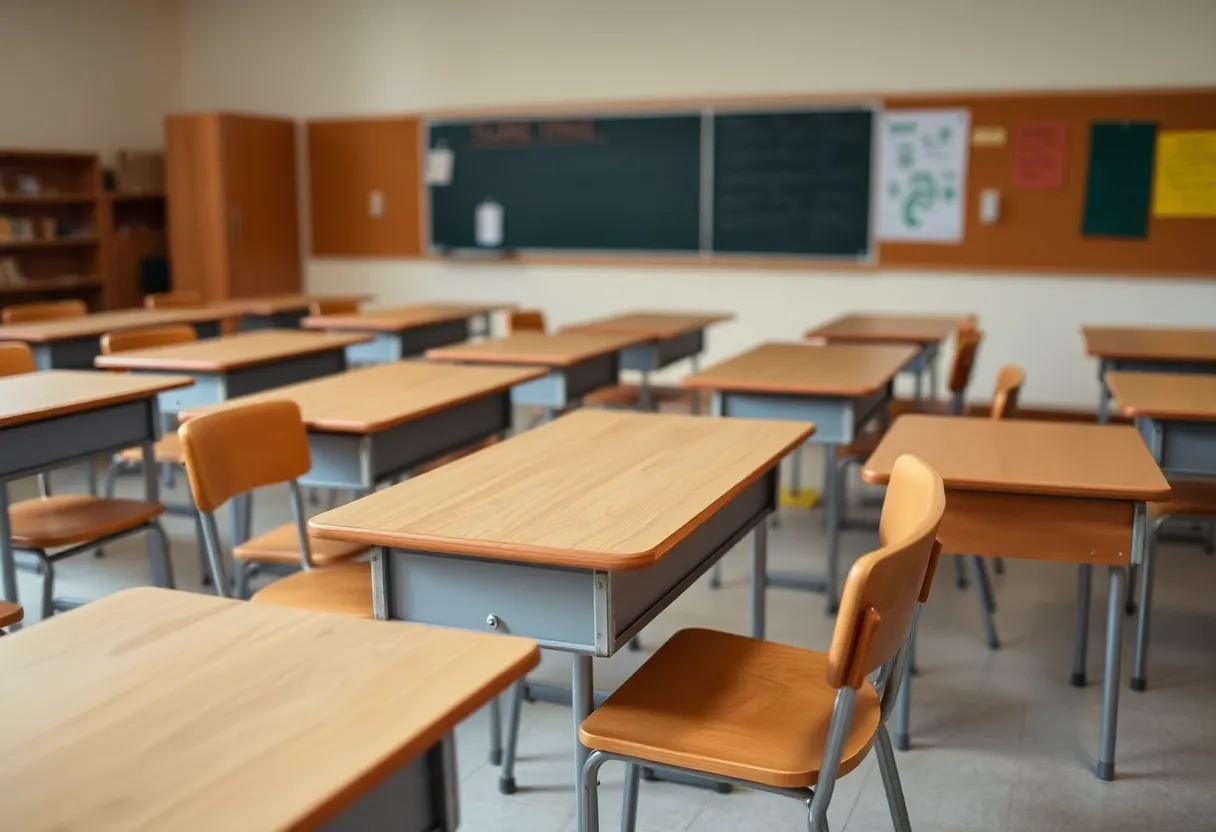News Summary
Nevada is encountering significant hurdles in educational funding with a projected $160 million shortfall in the State Education Fund due to declining local tax revenues. In light of these issues, Senate Majority Leader has introduced a bill aiming to secure funding for universal pre-kindergarten. The state struggles with high chronic absenteeism rates, low per-pupil spending, and challenges in effectively addressing educational needs amid ongoing financial constraints. Legislative efforts are underway to potentially reform property tax and explore other funding avenues.
Nevada Faces Educational Funding Challenges Amid Declining Revenue Projections and Legislative Efforts for Improvement
Las Vegas – Nevada is grappling with significant challenges regarding educational funding as the state forecasts a $160 million shortfall in the State Education Fund revenue. This decline is attributed to a downturn in local school support tax revenue, further complicating the funding landscape for the state’s education system. Amid these financial uncertainties, Senate Majority Leader Nicole Cannizzaro has introduced bill SB540, which aims to secure funding for universal pre-kindergarten education.
Governor Joe Lombardo has appointed Steve Canavero as the interim superintendent of public instruction, succeeding Jhone Ebert, who has transitioned to the Clark County School District. The State Board of Education is also engaging the public through surveys to aid in the selection of a new state superintendent. These transitions come at a critical time, as education officials express concerns over preserving existing educational programs in light of budget shortfalls.
The projected decline in state revenues could jeopardize various education bills with significant costs, including Cannizzaro’s initiative for pre-kindergarten funding. The proposed education budget for the upcoming cycle is approximately $8.6 billion. However, Nevada’s per-pupil funding is still lagging, approximately $4,000 behind the national average.
In addition to funding troubles, chronic student absenteeism poses a substantial barrier to educational attainment in Nevada. The rate of chronic absenteeism, defined as missing 10% or more of school days within an academic year, was recorded at 31% for the Clark County School District (CCSD) last school year, significantly higher than the pre-pandemic rate of 22%. This persistent absenteeism could potentially lead to a $610 million economic loss for the CCSD Class of 2025 alone.
Implications of Chronic Absenteeism
Chronic absenteeism not only hampers educational achievement but also increases reliance on social programs and elevates the probability of incarceration among students. If absenteeism rates are returned to pre-pandemic levels, an analysis indicates that Southern Nevada could experience an economic upside of $4.5 billion. The nonprofit organization Strengthen Our Children is actively advocating for strategies to mitigate absenteeism, including enhanced access to pre-kindergarten and childcare services.
Legislative Developments and Educational Policies
In the legislative arena, Assemblyman Natha Anderson has introduced AJR1, a proposal seeking a constitutional amendment to change property tax valuations to secure better educational funding. Also, Senator Angie Taylor spearheads SB444, which aims to restrict cellphone use in schools. Some advocates are even calling for an outright ban on cellphone use to support more effective learning environments.
Despite efforts to bolster funding and address chronic absenteeism, Nevada’s education system continues to dwell on issues related to funding adequacy, classroom sizes, and teacher pay. Nevada has the highest student-teacher ratio in the nation at around 25:1, with an average teacher salary of $74,812, which is slightly above the national average. However, inflation and rising living costs are diminishing the impact of these salaries, prompting advocacy groups to push for additional funding.
Future Outlook and Funding Solutions
Discussions surrounding potential tax increases to resolve budget gaps are ongoing, including proposals for a retail tax on digital products and modifications to property taxes. These measures could face opposition from the governor, complicating the efforts to find sustainable funding solutions. The Commission on School Funding is also navigating intricate challenges related to significantly increasing educational funding without comprehensive tax reform.
The National Education Association has highlighted Nevada’s struggle with low per-pupil spending, ranking the state 47th nationally, with each student receiving roughly $11,927. As the situation evolves, Nevada’s educational stakeholders remain committed to advocating for sustained and improved funding, emphasizing the importance of prioritizing education alongside public health initiatives to pave the way for a better future for the state’s students.
Deeper Dive: News & Info About This Topic
HERE Resources
Nevada Faces Educational Funding Crisis Amid Budget Shortfalls
Dr. Cummings Leads Alzheimer’s Research at UNLV
Las Vegas Enhances Public Safety with Tax Extension
New Superintendent Takes Charge in Las Vegas Education
Jhone Ebert Assumes Role as CCSD Superintendent
Las Vegas Welcomes New Superintendent for Education
Las Vegas Housing Crisis: Balancing Growth and Resources
Las Vegas Remembers Philanthropist Elaine Wynn
Nevada Faces Severe Housing Crisis with Rising Prices
Las Vegas Mother Files Lawsuit After Son’s Tragic Death
Additional Resources
- KTNV: Education Funding Data for Nevada
- RGJ: Washoe County School District Education Funding
- Las Vegas Sun: Nevada’s School Funding Gains
- Encyclopedia Britannica: Education
- 2News: Nevada Education Advocates Push for More Funding
Author: STAFF HERE LAS VEGAS WRITER
The LAS VEGAS STAFF WRITER represents the experienced team at HERELasVegas.com, your go-to source for actionable local news and information in Las Vegas, Clark County, and beyond. Specializing in "news you can use," we cover essential topics like product reviews for personal and business needs, local business directories, politics, real estate trends, neighborhood insights, and state news affecting the area—with deep expertise drawn from years of dedicated reporting and strong community input, including local press releases and business updates. We deliver top reporting on high-value events such as Electric Daisy Carnival, World Series of Poker, and Consumer Electronics Show. Our coverage extends to key organizations like the Las Vegas Chamber of Commerce and Three Square Food Bank, plus leading businesses in hospitality and entertainment that power the local economy such as MGM Resorts International, Caesars Entertainment, and Las Vegas Sands. As part of the broader HERE network, we provide comprehensive, credible insights into Nevada's dynamic landscape.



